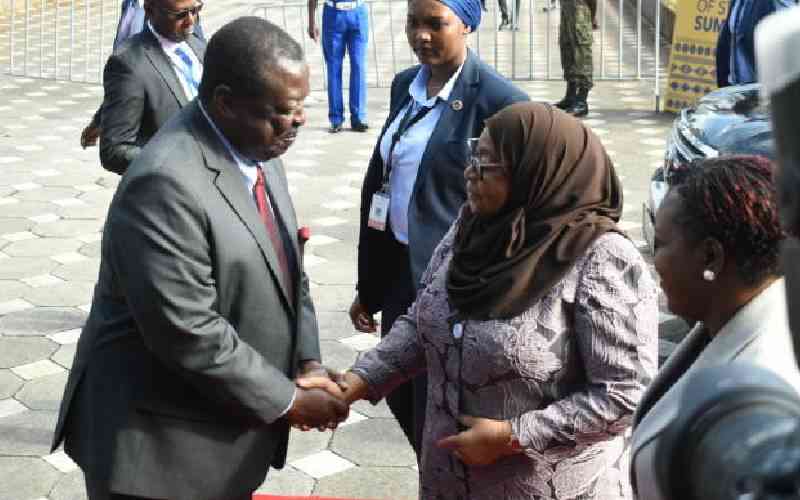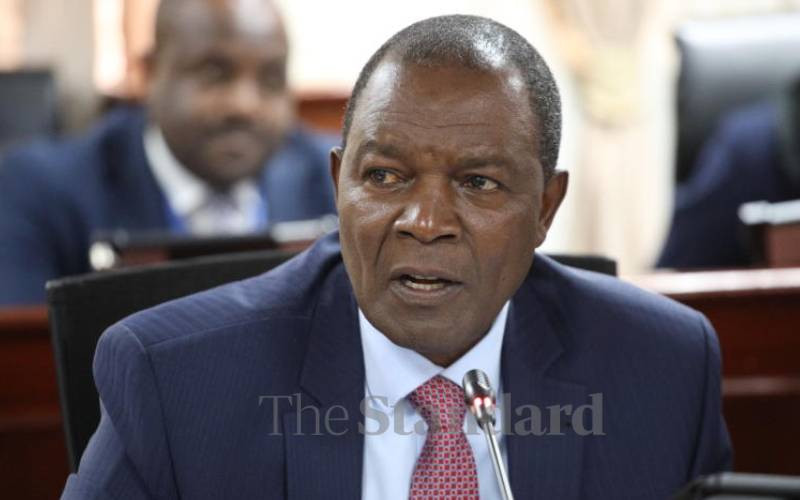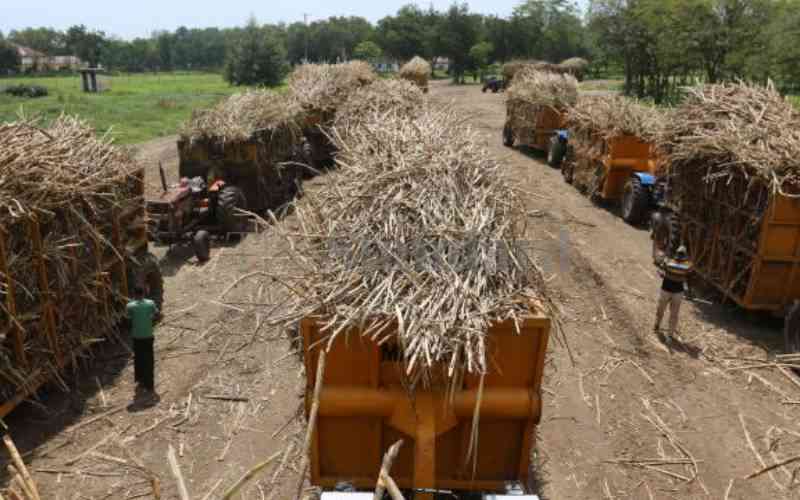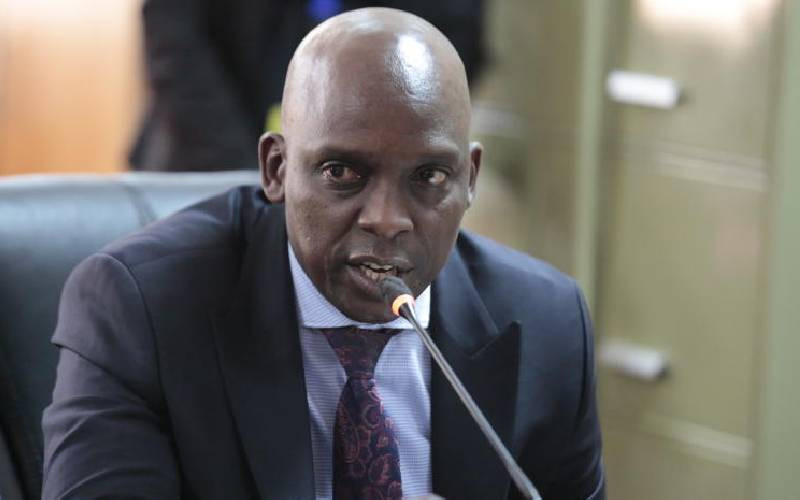
Prime Cabinet Secretary Musalia Mudavadi has said that Africa cannot achieve its aspiration of eliminating hunger and poverty if it does not take a sustainable approach to soil health, prudent use of agricultural inputs and environmental conservation.
Mudavadi called for the adoption of technologies that can make production systems efficient and effective.
“The realisation of this important goal will ensure that as we feed ourselves, we also leave an environment where our generations can sustain themselves,” he said.
Speaking during the opening of a three-day African Fertilizer and Soil Health Summit (AFSH) at KICC, Nairobi, the Prime Cabinet Secretary said that though fertiliser was estimated to contribute more than thirty percent of the crop yield, they could not sustain increased agricultural productivity and production.
Agriculture Cabinet Secretary Mithika Linturi indicated that soil fertility depletion has been cited as the root cause of declining per capita production arising from continuous mining of soil nutrients, and inappropriate farming practices including the use of blanket fertiliser recommendations.
He noted that in Kenya, only 18 per cent of land is arable for crop production and the area under cereals production alone measured some 2.7 million hectares or 47per cent, putting pressure on the soils in agricultural areas to produce enough food for local consumption and export.
“Traditional approaches towards soil fertility replenishment and low external input due to low availability and high cost of inputs by smallholders have led to land degradation,” said Linturi.
- Report unveils USD21 Trillion climate losses
- World Vision launches 'ENOUGH' campaign to tackle hunger, malnutrition in Kenya
- Food security: Kenya's long debate on GMOs far from over
- Nine Kenyan food systems fellows graduate in Addis Ababa
Keep Reading
The CS said that the current soil fertility replenishment strategy was based on Integrated Soil Fertility Management (ISFM) practices which advocate the use of organic and inorganic fertilisers for balanced nutrient fertilisation.
The proposed 10-year Fertilizer and Soil Health Action Plan 2023-2033 aims to “significantly increase investments in the local manufacturing and distribution of mineral and organic fertilizers, biofertilizers and biostimulants” and triple fertilizer use to 54kg/ha in 2033.
“For example, observations have been made that maize yields have stagnated despite increased fertilizer use. This has resulted in input bundling, emphasis on balanced nutrition, and soil sampling and testing," Mudavadi said.
The Prime Cabinet Secretary announced that in recognition of the need for integrated soil management, the Government in collaboration with other stakeholders has developed the National Soil Management Policy.
“This policy contains critical directions on sustainable agricultural soil and water management, soil management and environment, technology development, dissemination and utilisation, fertiliser development and investments,” he said.
He urged experts to take time and attend the event to appreciate the progress made in this area and witness the launching of the National Soil Management Policy.
Mudavadi acknowledged that it has been difficult for majority of the African governments to allocate budgets to agriculture and rural development at the levels anticipated in the Maputo declaration.
“This has been compounded by the competing resource allocation needs and the impact of the recent Covid-19 that affected the economic performance of most of the African countries and the world at large," he said.
As economies recover, the Prime Cabinet Secretary urged the summit to come up with financing proposals that are practical and achievable, saying they are the only way to reach the targets set within the action plans.
The event hosted by African Union was also attended by Frank Tumwebaze, Minister of Agriculture, Animal Industry and Fisheries of Uganda and Chair of the AU Specialized Technical Committee on Agriculture, Rural Development, Water and Environment, Amb Josefa Sacko, AU Commissioner for Agriculture, Rural Development, Blue Economy and Sustainable Environment, African Union Commission (AUC).
But the Alliance for Food Sovereignty in Africa (AFSA), which represents 41 African civil society organisations, on Friday expressed skepticism about the proposed approaches and called for the action plan to be revised.
“Civil society has a pivotal role in the fertiliser and soil health debate, not only by linking actors across the value chain but by challenging narratives that threaten seed diversity and pushing back against the productivist agenda that prioritizes yields over nutrition, health, and environmental integrity,” said Dr Million Belay, AFSA general coordinator.
“It’s disconcerting that African civil society was not consulted in the planning of the (summit) nor the formulation of its 10-year plan,” says AFSA, which represents more than 200 million smallholder farmers, pastoralists, hunter/gatherers, indigenous peoples, environmentalists, women, youth groups and agroecological entrepreneurs from across Africa.
AFSA is championing a shift to agroecology, which combines local knowledge with scientific innovation to restore biodiversity and build resilient food systems. The group argues that the AU’s plan marginalises sustainable approaches to agriculture and misrepresents what agroecology can do to address food security on the continent.
“We need to take care of our soils for future generations. There is the African saying: ‘We borrow land from our children’,” said Ferdinand Wafula of Bio Gardening Innovations, Kenya, one of the AFSA affiliates.
“We urge policymakers, governments, and donors to provide more funding to these alternatives because they mitigate a huge number of issues ranging from nutrition challenges to the climate crisis and the escalating prices for commodities.”
Wafula added that Africa needs the growth of diverse crops using ecological methods. “Synthetic materials kill microorganisms. If they kill that, we cultivate on dead soil. Dead soil does not give us nutrition.”
AFSA says soil degradation is increasing in Africa, with over 20 percent of land in most countries in the region degraded, “affecting over 65 percent of the population and resulting in significant adverse effects on food production and human livelihoods”.
"Soils across Africa have lost organic matter and are often bare and sometimes capped like concrete. They are missing the highly diverse microbial life in healthy natural soils,” AFSA said.
“There is an urgent need for proactive interventions to arrest and reverse soil degradation. Agricultural lands are especially prone to erosion and nutrient depletion.”
AFSA acknowledged the AU’s commitment to reversing soil degradation and addressing hunger, malnutrition, and poverty but said the proposed action plan will exacerbate economic strains by increasing dependency on expensive imported fertilisers, enriching a handful of fertilizer companies while African farmers face soaring costs.
The groups instead propose a shift from dependency on synthetic inputs to “showcasing the capabilities of African farmers to cultivate robust and diverse food systems through agroecological practices”.
AFSA also urged stakeholders to reject the current approach of placing yield above nutritional value, health, the environment, and cultural relevance. It called on policymakers to involve farmers and civil society in agricultural planning so that “policies can reflect the real needs and contexts of those at the heart of the food system”.
It proposed greater investments and specific financial support for agroecological practices.
“The current push to increase chemical inputs is a misguided agenda that profits corporations at the expense of smallholder African farmers,” the group said.
AFSA called for a comprehensive reevaluation of the Fertilizer and Soil Health Action Plan to focus on empowering farmers, protecting biodiversity, and building resilient food systems through agroecological and locally adapted practices.
 The Standard Group Plc is a multi-media organization with investments in media platforms spanning newspaper print
operations, television, radio broadcasting, digital and online services. The Standard Group is recognized as a
leading multi-media house in Kenya with a key influence in matters of national and international interest.
The Standard Group Plc is a multi-media organization with investments in media platforms spanning newspaper print
operations, television, radio broadcasting, digital and online services. The Standard Group is recognized as a
leading multi-media house in Kenya with a key influence in matters of national and international interest.











